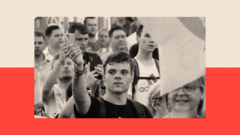In the heart of Freiberg, Saxony, 19-year-old Nick reflects on the desire for a safe environment free from fear, echoing sentiments shared by many young Germans. As the nation approaches its national elections, the surge in support for the Alternative für Deutschland (AfD) party, particularly among young men, has become a notable trend. Polls reveal that young males are increasingly gravitating towards far-right ideologies, with concerns over immigration and the perceived threat it poses to German societal values being pivotal influences.
Nick and his friend Dominic, both of whom express support for the AfD, articulate their mixed views on immigration. While they endorse integration and respect for individuals who contribute positively to society, they also voice critiques of those exploiting the asylum system. Such concerns have gained traction following several high-profile incidents attributed to asylum seekers, leaving a significant mark on public perception and political discourse.
Recent studies underscore this growing shift, indicating that 26% of German men hold favorable opinions of the AfD compared to just 11% of women. Among voters under 24, support for the party in the recent elections saw a striking increase, raising alarm about the challenges this trend poses to Germany’s multifaceted identity, especially in light of its historical struggles with far-right politics.
The role of social media cannot be overlooked. Platforms like TikTok have emerged as critical arenas where the AfD can cultivate support, leveraging their presence to rally a younger audience. Analysis indicates a significant disparity in follower counts, with AfD accounts outperforming other parties. This digital dominance resonates with young adults who navigate an increasingly fragmented media landscape.
Some young supporters, like TikTok influencer Celina Brychcy, emphasize their commitment to traditional values and advocate for national pride, often asserting that their positions are misinterpreted as racist. Their narratives reflect a broader dissatisfaction with current gender dynamics and societal expectations, appealing to a cohort of young men seeking alternatives to more progressive, left-leaning ideologies.
The normalization of the far-right sentiment among youth prompts concerns regarding shifts in societal perceptions — particularly regarding historical narratives and national identity. As educators like Diana Schwitalla report, instances of Holocaust denial and revisionist views about Nazism have surfaced among younger generations, marking a troubling trend in historical discourse.
The upcoming election looms large as the country grapples with the implications of rising far-right sentiment. While many view support for the AfD as a rejection of mainstream politics, it suggests a deeper yearning for radical societal transformation among its adherents.
Ultimately, the far-right’s increasing appeal among Germany's youth poses significant questions about the trajectory of politics in the country. In a climate clamoring for change in the face of perceived threats, the AfD may well find itself at the forefront of a shifting political landscape, driven by a younger generation that views its vision as a viable pathway toward the future.





















